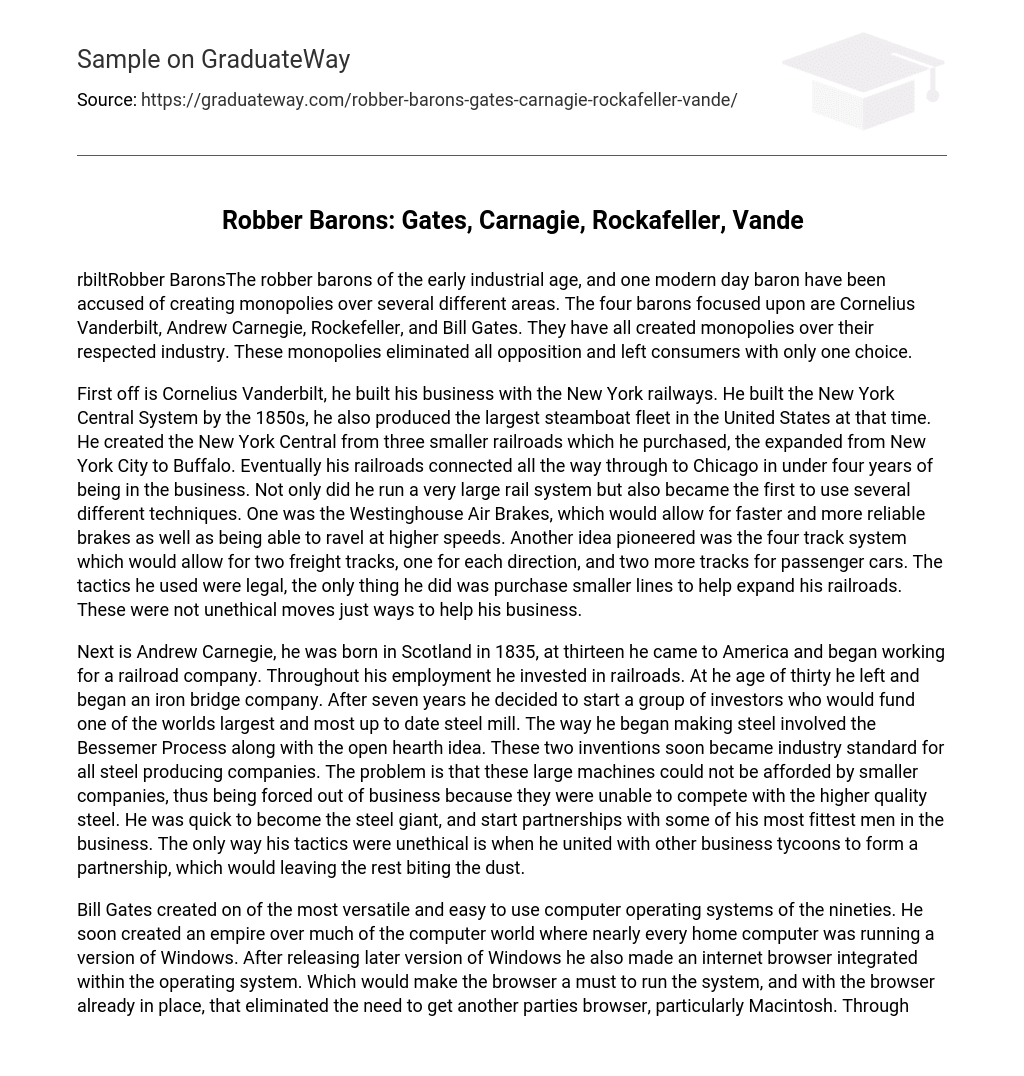rbiltRobber BaronsThe robber barons of the early industrial age, and one modern day baron have been accused of creating monopolies over several different areas. The four barons focused upon are Cornelius Vanderbilt, Andrew Carnegie, Rockefeller, and Bill Gates. They have all created monopolies over their respected industry. These monopolies eliminated all opposition and left consumers with only one choice.
First off is Cornelius Vanderbilt, he built his business with the New York railways. He built the New York Central System by the 1850s, he also produced the largest steamboat fleet in the United States at that time. He created the New York Central from three smaller railroads which he purchased, the expanded from New York City to Buffalo. Eventually his railroads connected all the way through to Chicago in under four years of being in the business. Not only did he run a very large rail system but also became the first to use several different techniques. One was the Westinghouse Air Brakes, which would allow for faster and more reliable brakes as well as being able to ravel at higher speeds. Another idea pioneered was the four track system which would allow for two freight tracks, one for each direction, and two more tracks for passenger cars. The tactics he used were legal, the only thing he did was purchase smaller lines to help expand his railroads. These were not unethical moves just ways to help his business.
Next is Andrew Carnegie, he was born in Scotland in 1835, at thirteen he came to America and began working for a railroad company. Throughout his employment he invested in railroads. At he age of thirty he left and began an iron bridge company. After seven years he decided to start a group of investors who would fund one of the worlds largest and most up to date steel mill. The way he began making steel involved the Bessemer Process along with the open hearth idea. These two inventions soon became industry standard for all steel producing companies. The problem is that these large machines could not be afforded by smaller companies, thus being forced out of business because they were unable to compete with the higher quality steel. He was quick to become the steel giant, and start partnerships with some of his most fittest men in the business. The only way his tactics were unethical is when he united with other business tycoons to form a partnership, which would leaving the rest biting the dust.
Bill Gates created on of the most versatile and easy to use computer operating systems of the nineties. He soon created an empire over much of the computer world where nearly every home computer was running a version of Windows. After releasing later version of Windows he also made an internet browser integrated within the operating system. Which would make the browser a must to run the system, and with the browser already in place, that eliminated the need to get another parties browser, particularly Macintosh. Throughout much of his career Gates used very questionable tactics ever since the start of stealing Xeroxs idea of a graphical user interface, then cutting off of Steve Jobs, who later formed Apple. Very unethical maneuvers were exhibited by him because the whole time he knew that using Explorer would simply force out any other competitors.
Rockefeller after working since he was sixteen, at 23 he invested all of his current money into petroleum refining, a growing industry at the time. While actually drilling oil was difficult due to lack of chances to find oil underground, he stuck to the refining business. The only problem he saw was that at the time it was an unstable market, which he thought was due to too many different producers and refiners. After five years Rockefellers Standard Oil Company was making two or three percent of the nations entire crude oil amount. Rockefeller was able to get a secret deal with railroads to be given 25 to 50 percent off what they charged their competitors were charged. After Standard Oil success occurred it led to establishing horizontal combinations. The part was though after they bought out a company, they would control it, but the company would keep their name so not to gain suspicion. These tactics were illegal because he was tearing down the competitors by getting breaks on charges so he could lower his price while they could not then once they went out he would set out again. His tactics were fairly unethical because he was cheating the consumers by owing much more than they knew about.
In all the four barons each had different ways to maneuver to gain wealth. Some were much more successful than others, while some tended to ride along the line of legal and illegal in their operations. Yet, without these barons America would be a much different place, because even while being unethical they still led advances in technology to help out.





